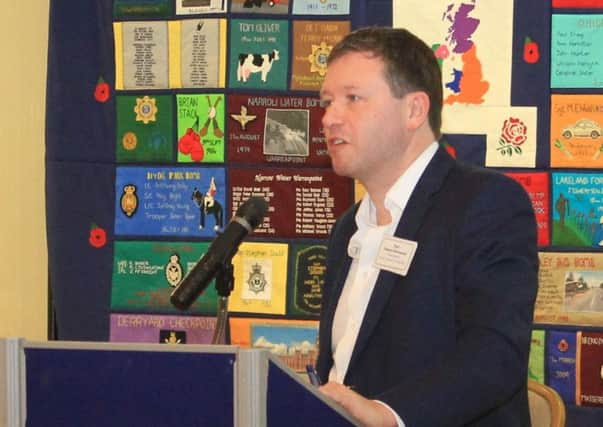Historians '˜must go back into core of Stormont House Agreement'


Prof Thomas Hennessy from Canterbury Christ Church University made his call at the annual conference of the South East Fermanagh Foundation (SEFF) in Enniskillen on Saturday, which addressed what organisers said is a rising tide of concern among terror victims – a distorted view of the Troubles being shaped by legal actions against the state, in preference to an historian’s balanced examination.
Prof Hennessy said it is now broadly accepted that the republican violence which claimed 60% of the 3,700 lives during the Troubles was justified by a desire for legitimate civil rights in the 1970s.
Advertisement
Hide AdAdvertisement
Hide AdIn fact, the IRA’s campaign was never about civil rights but was entirely focused on “the desire to achieve a united Ireland”, he said.
For many people it has now been openly or tacitly accepted that nationalists in Northern Ireland had no alternative but to resort to violence. But this means that the peaceful and democratic approach of the largest nationalist party throughout the Troubles has been forgotten: “The SDLP has now been written out of history”.
He said that US envoy Richard Haas had “hated” historians and the planned role for them to create an agreed history of the Troubles during the Stormont House Agreement talks was suddenly downgraded “at the last minute” so that they were left to be only responsible for “a chronology” of events.
Advertisement
Hide AdAdvertisement
Hide AdAs another example of why this was so dangerous, he said the standard view of history was that the role of the Army in the riots of the ‘The Falls Road Curfew’ in 1970 represented a “hardening of [Tory] attitude which helped create the fledgling Provisional IRA”.
“But look at the documents and you can see the government had no plans for hardening security. They were responding to a growing republican threat on the ground.”
Without intending offence to lawyers, he said the problem with the current “transitional justice” approach to the past is that it has a disproportionate focus on human rights, past crimes and the security forces.
The UK must be held to account for its wrongdoings, but only historians – not lawyers – will weigh all documents and evidence to arrive at a balanced view of the past, including Dublin’s role in the origins of PIRA, he said.
Advertisement
Hide AdAdvertisement
Hide Ad“SEFF can make clear to the DUP that there is another way to deal with the past.”
Ken Funston, SEFF advocacy manager, told the conference that terror victims are always being told to “move on” but that nobody dares say this to victims in historic sex abuse inquiries.
In fact, surveys showed terror victims are significantly more supportive of power-sharing and the peace process than the rest of the population, he said – yet they are still seen as an embarrassment and hindrance to progress.
The current statutory definition of a victim – which includes perpetrators – is at odds with both the UN and EU definitions and starkly without precedent in the aftermath of any other conflict in the world, he said.
Advertisement
Hide AdAdvertisement
Hide AdA closer parallel to Northern Ireland, he said, is post-Holocaust revisionism in which Jews are made to carry the full blame for atrocities against them by Nazis.
Here, reasons are also now found to blame victims for atrocities against them by terrorists; for example, people “deserved” to die because they had joined the security forces.
In his address Omagh bomb civil action lawyer Matthew Jury said that true personal peace for victims could only come through truth and justice; only then is reconciliation possible. This is different to the peace “that politicians builds their careers on” he said.
Justice is critical to learn lessons from the past, so it will not be repeated – and to avoid sending the wrong message to terrorists now and in the future.
Advertisement
Hide AdAdvertisement
Hide AdBut if the government will not act, private citizens’ viable alternatives are inquests and private civil or criminal actions, he added.
The RIRA tried to rewrite history after the 1998 Omagh bomb by blaming the police and government for the carnage, he said. However, the later civil action “reclaimed history” by finding four terrorists liable; they are now “showing fear” and “losing their temper” in court as damages are pursued.
Also attending the conference was former Presbyterian Moderator Norman Hamilton, UUP MP Tom Elliott, victims campaigners Willie Frazer and Barrie Halliday.
The event was chaired by Oliver Wilkinson, Chair of the Board of the Victims and Survivors Service, with closing comments made by Victims’ Commissioner Judith Thompson.